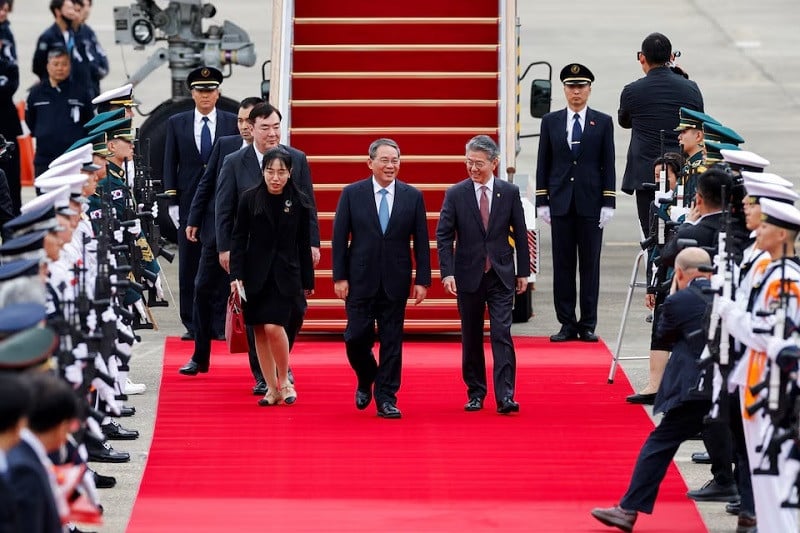Chinese Premier Li Qiang hailed a “restart” in relations with Japan and South Korea during the first trilateral talks in four years on Monday, with a focus on reviving trade and security dialogues that had been hampered by global tensions.

Meeting with South Korean President Yoon Suk Yeol and Japanese Prime Minister Fumio Kishida in Seoul, Li emphasized the need to resume negotiations for a three-party free trade agreement, which have been stalled since 2019.
As the summit commenced, Li described the meeting as “both a restart and a new beginning,” urging a comprehensive renewal of cooperation between East Asia’s economic giants. He stressed the importance of separating politics from economic and trade issues, advocating for an end to protectionism and the decoupling of supply chains.
“For China, South Korea, and Japan, our close ties will not change, the spirit of cooperation achieved through crisis response will not change, and our mission to safeguard regional peace and stability will not change,” Li stated.
The meeting itself is seen as a positive step towards improving relations among the three nations, which are often characterized by a mix of suspicion, rancor, and constructive engagement.
Leif-Eric Easley, a professor at Ewha University in Seoul, noted, “The China-Japan-South Korea trilateral summit is more about reducing frictions than reshaping geopolitics.”
China, alongside US-allied South Korea and Japan, is working to manage mutual distrust amidst the rivalry between Beijing and Washington, tensions over Taiwan, and North Korea’s nuclear program.
Yoon and Kishida have strengthened ties with each other and the United States, engaging in unprecedented trilateral cooperation on military and other measures.
US President Joe Biden has imposed higher tariffs on various Chinese imports, including electric vehicle batteries and computer chips. Donald Trump, his opponent in the upcoming presidential election, has proposed tariffs of 60% or higher on all Chinese goods.
Areas of Agreement
A joint declaration after the meeting called for China, Japan, and South Korea to formalize regular high-level communication and collaborate on climate change, conservation, health, trade, and international peace. They also set a goal of increasing people-to-people exchanges to 40 million by 2030 through cultural, tourism, and educational programs.
The leaders issued separate joint statements on pandemic preparedness and intellectual property protection.
Regarding North Korea, Yoon and Kishida urged Pyongyang not to proceed with a planned rocket launch involving ballistic missile technology banned by United Nations Security Council resolutions. Li called for restraint to prevent further complications on the Korean peninsula, but did not mention the satellite. China, North Korea’s main ally and largest trade partner, along with Russia, has advocated for easing UN sanctions on North Korea.
Trade Relations
The trade relationship between China, South Korea, and Japan has become increasingly competitive over the past decade, further strained by US demands for allies to shift key product supply chains, such as semiconductors, away from China.
Yoon said the leaders agreed to create a transparent and predictable trade and supply chain environment but did not provide details.
At a forum with top business executives from the three countries, it was acknowledged that global challenges had hindered cooperation, but there was a commitment to work together to support trade and stabilize supply chains.
Easley suggested that “relations would advance further if China allows better access for Japanese and Korean diplomats in Beijing and improves the business environment for foreign companies.”
South Korea, Japan, and China have held 16 rounds of official negotiations for a three-way FTA since 2012. The last negotiation in November 2019 agreed on liberalization at a level higher than the Regional Comprehensive Economic Partnership (RCEP), covering areas such as trade of goods and services, investment, customs, competition, and e-commerce.
Monday’s summit followed separate bilateral talks among the leaders. In these meetings, Li and Yoon agreed to a diplomatic and security dialogue and to resume free trade talks, while Kishida and Li discussed Taiwan and agreed to hold a new round of bilateral high-level economic dialogue.











































